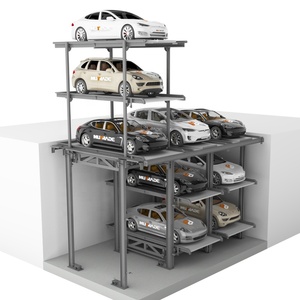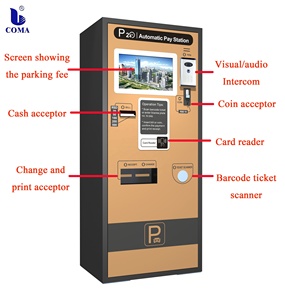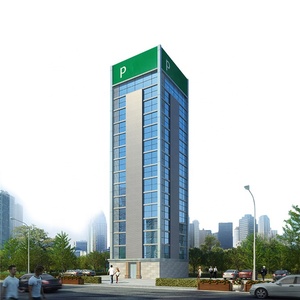Top categories

Fluid & Chemicals

Interior Accessories

Exterior Accessories

Auto Electronics

Vehicle Tools

Vehicle Equipment

Recovery & Off-road Accessories

Petrol Service Equipment

Car Care & Cleanings

Automobile interconnected products
About products and suppliers
In an era where urban spaces are at a premium, the efficiency of car parking has become a critical concern for city planners, businesses, and drivers alike. The latest advancements in car parking machine technology are reshaping the landscape of urban parking, offering innovative solutions to optimize space, reduce congestion, and enhance user experience. From the integration of Parking Guidance Systems (PGS) to the adoption of smart meters and mobile apps, this article delves into the evolution of parking technology, exploring how these developments not only streamline the parking process but also pave the way for smarter, more sustainable urban environments.
The Evolution of Car Parking Machine Technology
The landscape of car parking has been transformed by technological advancements, leading to the development of sophisticated Parking Guidance Systems (PGS) and Parking Access and Revenue Control Systems (PARCS). These systems have revolutionized the way drivers locate and pay for parking. PGS technology, for instance, employs various sensors and real-time data to guide drivers to available parking spaces, increasing the utilization of parking facilities. PARCS, on the other hand, has replaced traditional payment methods with modern solutions like RFID, license plate recognition, and wireless technology, enhancing operational efficiency and customer satisfaction.
Innovations such as mobile apps have further streamlined the parking process, allowing users to reserve and pay for parking in advance. Smart meters have also been introduced in street parking, equipped with multiple payment options and the ability to adjust rates based on demand. These meters, along with apps, contribute to a more efficient and user-friendly parking experience. The integration of smart technology in parking solutions not only improves the convenience for users but also aids in the management and security of parking facilities.
Understanding Different Types of Car Parking Machines
Car parking machines have evolved significantly since their inception, with various types available to meet different needs. Initially, parking meters were mechanical devices that accepted coins and used a dial and pointer to indicate the remaining time. Over time, these evolved into digital versions with electronic components, offering greater flexibility and ease of reconfiguration. Modern parking meters, often referred to as multispace meters, control multiple spaces and offer features like on-screen instructions and credit card payments, eliminating the need for a pocketful of coins.
The latest advancements in parking technology include pay by space meters, where drivers enter a space number and make a payment, and the meter tracks the time remaining. These meters often come equipped with vehicle detection technology, providing benefits such as way-finding for unoccupied spaces and remote violation detection. Additionally, some meters offer the convenience of adding time via phone and sending alerts before expiration. Solar-powered options are also available, which are not only eco-friendly but also capable of sending wireless signals for maintenance needs.
Security has been a paramount concern for parking meters due to exposure to vandalism and theft. To combat this, modern meters are designed with enhanced durability and can immediately report issues to maintenance staff. This ensures that they remain operational and secure, providing a reliable service for municipalities and users alike.
Key Features of Modern Parking Machines
Modern parking machines incorporate a variety of features designed to streamline the parking experience. Vehicle and employee scheduling capabilities allow for efficient space allocation and management, tailored to individual shifts and office hours. Automated ticketing systems enable users to obtain parking tickets and process payments online, reducing wait times and improving convenience.
These systems are equipped to track available parking spaces in real-time, guiding drivers to the nearest vacant spot, thus optimizing lot usage. Scalability is a critical aspect, ensuring that the parking solution can adapt to businesses of varying sizes without compromising on performance.
Smart parking solutions also manage visitor traffic effectively, providing contingency plans for sudden increases in vehicle numbers and facilitating smoother entry and exit flows. Interoperability is another key feature, with systems designed to function across different operating systems, ensuring a wide range of device compatibility.
Enhanced revenue streams are possible through dynamic pricing models and reward programs, incentivizing repeat usage. Improved safety measures, such as real-time lot data and license plate recognition, contribute to a secure parking environment. Additionally, integrated payment systems and access to real-time data allow for a more personalized user experience and informed management decisions.
How Car Parking Machines Enhance Parking Efficiency

Smart parking solutions significantly enhance parking efficiency by streamlining the process of finding and managing parking spaces. With real-time data, these systems allow for effective management of parking lot occupancy, enabling a smoother flow of vehicles and reducing the need for manual monitoring. This optimization leads to a decrease in traffic congestion within the lot, contributing to a more efficient use of space and time for both drivers and parking lot owners.
Moreover, the integration of smart technology in parking systems, such as automatic barriers and ANPR (Automatic Number Plate Recognition) systems, facilitates quick and secure access to parking areas. This technology ensures that only authorized vehicles can enter, enhancing the security and utilization of the parking lot. The convenience of using a smartphone to access parking barriers and share digital keys further adds to the efficiency, eliminating the need for physical tickets or manual gate operation.
The adoption of smart parking machines also contributes to environmental sustainability by reducing the carbon emissions associated with vehicles idling while searching for parking spots. By minimizing the time spent looking for parking, these systems not only save time and fuel but also help in reducing the stress levels of drivers, making the parking experience more pleasant and efficient.
Innovative Materials and Design in Parking Technology
Innovative materials and design play a pivotal role in the development of green parking solutions. The use of permeable pavers, for instance, contributes to reducing runoff and enhancing rainwater filtration. These pavers are not only functional but also add aesthetic value to parking areas, serving as decorative elements in entryways and landscaping. On the other hand, pervious concrete is recognized for its ability to mitigate toxic runoff and promote water absorption into the ground, which is beneficial in high-traffic parking zones.
The integration of vegetation into parking designs is another innovative approach. Plants are not merely ornamental; they actively participate in absorbing CO2 emissions, preventing erosion, and managing runoff, all while contributing to the reduction of the urban heat island effect. These green additions are essential components of a sustainable parking infrastructure, enhancing the ecological footprint of parking facilities.
Smart technology also plays a crucial role in the evolution of parking solutions. Advanced systems that adjust to the number of vehicles and people present, such as those implemented in the River South project in Austin, Texas, exemplify the fusion of technology and sustainability. These systems not only conserve energy but also support water conservation through treatment and reuse, underlining the importance of comprehensive, eco-friendly parking designs.
The Role of Smart Technology in Parking Solutions
In the realm of parking solutions, smart technology plays a pivotal role. Sophisticated systems like ANPR (Automatic Number Plate Recognition) are designed to cater to the specific needs of various parking environments. This technology not only enhances the customer experience but also aims to reduce car park misuse and potentially increase parking revenue. The integration of such systems allows for a seamless operation, digitalizing and streamlining the management of large urban car parks.
Moreover, the advent of web-based service platforms has revolutionized the way information is gathered and processed in the parking industry. These platforms offer a robust and innovative approach to managing parking sites, providing site owners with increased control and oversight. The use of vehicle detection sensors further complements these systems by monitoring the usage of individual parking bays, ensuring efficient utilization of space.
The incorporation of smart technology into parking solutions also includes user-friendly payment options. Systems like Pay & Walk, which blend cutting-edge technology with stylish design, simplify the payment process for motorists. Such innovations are indicative of the next generation of customer experience in car park management, where convenience and efficiency are paramount.
Advantages of Upgrading to Advanced Parking Systems
Upgrading to advanced parking systems offers numerous benefits, including enhanced convenience and security. Smart parking solutions enable seamless operation through smartphone integration, allowing for remote access and digital key sharing. This technology not only simplifies the parking process but also supports efficient space management with real-time data and automated access for registered vehicles.
The implementation of smart parking systems can significantly reduce carbon emissions by minimizing the time vehicles spend idling in search of parking spots. This contributes to a decrease in traffic congestion and can improve the overall safety of parking areas. Moreover, the potential for optimizing revenue is notable, as these systems allow for dynamic management of parking space availability and can adjust pricing based on demand.
Smart parking technologies are designed to be robust and low-maintenance, with options like solar-powered units enhancing sustainability. They also integrate seamlessly into smart city infrastructures, providing valuable data that can be used to improve urban planning and mobility. The security features of these systems, including real-time monitoring and durable barriers, offer protection against unauthorized access and potential vandalism, ensuring a safer environment for both vehicles and pedestrians.
The stress reduction for drivers is an intangible yet significant advantage. The assurance of having a reserved parking spot can alleviate the daily pressures associated with parking in busy areas. Overall, the transition to smart parking systems represents a forward-thinking choice that can deliver a more streamlined, eco-friendly, and profitable parking operation.
Case Studies: Successful Implementations

In the realm of parking efficiency, our platform has been instrumental in facilitating the adoption of sophisticated car parking systems across various industries. For instance, the integration of automated gate systems with license plate recognition software has revolutionized parking management, offering a seamless experience for both operators and users. These systems, which often include advanced parking management software, allow for real-time monitoring and streamlined operations.
Another successful implementation is the deployment of RFID parking solutions for residential and commercial lots. These systems enhance security and convenience by enabling quick access and payment processes. The use of RFID technology has been particularly effective in managing high-traffic parking areas, ensuring smooth ingress and egress.
The introduction of smart parking solutions, such as geomagnetic sensors and ultrasonic guidance systems, has provided parking operators with tools to maximize space utilization and reduce congestion within parking facilities. These technologies offer real-time data on parking space availability, guiding drivers to open spots and thus reducing the time spent searching for parking.
The rise of multi-level car parking lifts, which are an innovative solution to space constraints in urban areas, has also been notable. These systems allow for the vertical stacking of vehicles, effectively doubling or tripling parking capacity without the need for additional ground space. The versatility of these systems makes them suitable for both commercial and residential applications, showcasing the adaptability of modern parking solutions.
Choosing the Right Car Parking Machine
When selecting a car parking machine for your needs, consider the diverse range of options available. Car parking lifts, for instance, are a practical solution for both commercial and residential spaces, designed to maximize parking capacity efficiently. These systems come in various configurations, including two-post lifts for smaller areas and multi-level lifts for high-density parking requirements.
Parking pay station machines streamline the process of managing parking fees and provide a user-friendly interface for customers. These systems often integrate advanced features such as touch screens and smart card payments, enhancing the user experience and reducing wait times.
For those looking to implement a more automated solution, our platform offers smart parking systems equipped with features like Automatic Number Plate Recognition (ANPR) that allow for unattended parking management. These systems are not only convenient for users but also provide a seamless flow of traffic within the parking lot.
It's essential to assess the specific needs of your parking facility to determine the most suitable car parking machine. Factors such as the size of the parking area, the volume of traffic, and the level of automation desired are critical in making an informed decision. Our range of parking solutions ensures that you can find the right fit to enhance parking efficiency and customer satisfaction.
Conclusion

The advancement of car parking machine technology stands as a testament to the ingenuity of modern urban planning and the relentless pursuit of efficiency. Through the evolution of Parking Guidance Systems and the implementation of smart parking solutions, we have witnessed a significant transformation in how drivers locate, reserve, and pay for parking. The integration of real-time data, ANPR systems, and eco-friendly materials has not only improved the convenience and security of parking facilities but also contributed to the sustainability of urban environments. Our role in facilitating the adoption of these technologies underscores the global shift towards more intelligent infrastructure. As we look to the future, the continued innovation in parking technology promises to further enhance the efficiency of our cities, reduce environmental impact, and improve the overall quality of urban life. Choosing the right car parking machine can lead to a more streamlined, profitable parking operation, tailored to the specific needs of any facility. In conclusion, embracing these advanced parking systems is not just an upgrade—it's a leap towards building smarter, more livable cities.

















 浙公网安备 33010002000092号
浙公网安备 33010002000092号 浙B2-20120091-4
浙B2-20120091-4